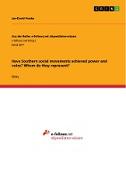Have Southern social movements achieved power and voice? Whom do they represent?
BücherAngebote / Angebote:
Essay from the year 2016 in the subject Politics - International Politics - General and Theories, grade: 1, Oxford University, language: English, abstract: What do the Ghanaian Convention People's Party, the Narmada Bachao Andolan, and the Occupy movement have in common? Answer: they all are (Southern) social movements inhabiting and representing the subaltern. What is more, they are indicative of how the dynamics in which such social movements are embedded and to which they respond have changed and of the subsequent transformative impact that has had on counter-hegemonic social action and representation. In this paper, I will first delineate three waves of Southern social movements, namely national liberation, anti-developmentalist, and anti-neoliberal movements, trace their dialectic interlinkages, and address their differentiated levels of success. To that end, I will shed light on one particular social movement of each phase and discuss how they contended with the prevailing status quo, their motivations, aims, and achievements. I will then argue that, as both the spaces and groups they represent and the structural mechanisms they oppose have become consolidated, deterritorialized, and globalized, we should reject the state-based North-South binary in favor of a cosmopolitan rearticulation of Marxist class antagonism that makes the transnational subaltern the centerpiece of both oppression and resistance. Thereby, I am endorsing the post-sovereign counter-hegemonic project which does not only recognize the inexorability of globalization but also the dialectic potential inherent in that fact.
Folgt in ca. 10 Arbeitstagen




